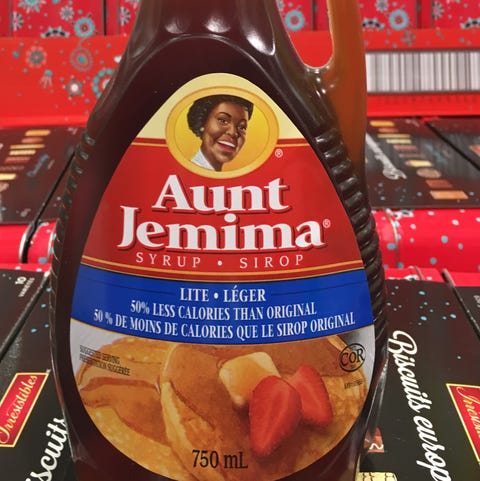
Roberto Machado NoaGetty Images
- Quaker Oat is retiring the Aunt Jemima brand to "make progress toward racial equality."
- Aunt Jemima is based on a real woman, Nancy Green, who was a storyteller, cook, and missionary worker.
- Nancy Green actually worked with the Aunt Jemima brand until 1923.
Article by Korin Miller in "Women's Health":
After years of criticism that the Aunt Jemima label is a caricature of Black women and promoted racist stereotypes,
namely the "mammy" character, Quaker Oats is finally taking action. The
company announced this week that it’s retiring the Aunt Jemima brand.
"As
we work to make progress toward racial equality through several
initiatives, we also must take a hard look at our portfolio of brands
and ensure they reflect our values and meet our consumers'
expectations," the company said in a statement to CNN.
Quaker
Oats didn’t mention it, but the change seems to be tied to a viral
TikTok from @singkirbysing in which the singer details "how to make a
non-racist breakfast." In the TikTok, Kirby talks about the history
behind the Aunt Jemima brand, and ends with,“Not today. Black Lives
Matter, people," as she dumps a box of Aunt Jemima pancake mix down the
sink.
This wasn't the first time the Aunt Jemima logo came under criticism. In a 2015 opinion piece for the New York Times, Cornell University professor Riché Richardson said the logo was "very much linked to Southern racism" because it was based on a "'mammy,' a devoted and submissive servant who eagerly nurtured the children of her white master and mistress while neglecting her own."
This wasn't the first time the Aunt Jemima logo came under criticism. In a 2015 opinion piece for the New York Times, Cornell University professor Riché Richardson said the logo was "very much linked to Southern racism" because it was based on a "'mammy,' a devoted and submissive servant who eagerly nurtured the children of her white master and mistress while neglecting her own."
So,
what exactly is the history behind Aunt Jemima, and was the
controversial character based on a real person? Here’s everything you
need to know:
Aunt Jemima was based on a caricature that a real Black woman, Nancy Green, was hired to portray.
Aunt Jemima was based on a caricature that a real Black woman, Nancy Green, was hired to portray.
According to the Aunt Jemima
website, Aunt Jemima was first "brought to life" by Nancy Green, a
woman they ID as a "storyteller, cook, and missionary worker" and who
was hired to promote the pancake mix and syrup.
The
brand’s name, though, is based off of a song called "Old Aunt Jemima."
After Chris Rutt, a newspaperman, and Charles Underwood came up with the
idea for a ready-mixed, self-rising pancake flour, Rutt attended a
vaudeville show in 1889 where he heard "Aunt Jemima" sung by a blackface
performer who was wearing an apron and bandanna headband, according to African American Registry (AAREG). The song was also reportedly sung by slaves, according to CNN. After hearing the song, Rutt decided to call their pancake flour "Aunt Jemima."
Nancy Green was one of the first Black corporate storytellers in the U.S.
Nancy
didn’t come up with the Aunt Jemima recipe, but she became the first
living trademark in the advertising world, per the AAREG.
Nancy was born into slavery.
Nancy was born into slavery.
Nancy
was born a slave in Montgomery County, Kentucky. (Worth noting: The
Aunt Jemima website neglects to mention this part of Nancy Green's
biography.) She was recruited by the R.T. Davis Milling Company, who
bought the Aunt Jemima formula and brand, when she was 56.
Nancy regularly promoted the Aunt Jemima brand.
At
the World's Columbian Exposition in Chicago in 1893, Nancy demonstrated
the pancake mix and served thousands of pancakes. Her booth became so
popular that special police officers were assigned to it to keep the
crowds moving, the AAREG says. She was given a medal and certificate by
fair officials for her performance.
Nancy signed a lifetime contract to promote Aunt Jemima.
Afterward,
she traveled on promotional tours across the country, the AAREG
reports. Suddenly, pancakes became hugely popular. Nancy stayed in the
job until she died in a car crash in 1923.
